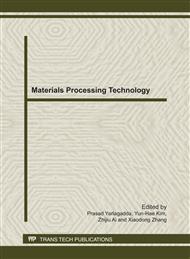p.120
p.125
p.133
p.138
p.142
p.146
p.151
p.155
p.159
Learning the Distribution Characteristics of Critical Machines in Production Scheduling Problems
Abstract:
A critical machine identification algorithm is proposed for the job shop scheduling problem in which the total tardiness must be minimized. An optimization-based procedure is devised to learn the distribution characteristics of critical machines in a specific scheduling instance. The proposed simulated annealing algorithm optimizes the scheduling problem after the capacity constraints for each machine are modified. A genetic algorithm based on combined dispatching rules is designed to verify the effectiveness of the proposed methodology.
Info:
Periodical:
Pages:
142-145
DOI:
Citation:
Online since:
September 2011
Authors:
Price:
Сopyright:
© 2011 Trans Tech Publications Ltd. All Rights Reserved
Share:
Citation:


